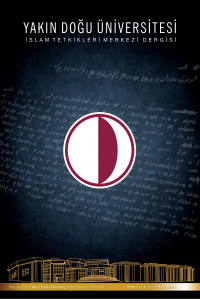İslam Felsefesinde “Vucud-u Zihnî” (Zihinsel Varlık) Anlayışına Bir Geç Dönem Osmanlı Örneği: İsmail Gelenbevî II
Bilginin mahiyeti ve menşei ve doğruluk problemleri felsefeninebedi problemleridir. İslam epistemolojisi algılayan özne, algılanannesne ve alelıtlak algı arasındaki üçlü ilişkiyle ilgilenmiştir. Ancakbu konuları açıklarken bilgiyi gerçekliğin bilenin ruhunda kalansureti olarak sunmaları töz ve araz kategorilerinde bir takım karışıklıklarasebep olmuş, bu yüzden farklı teoriler ortaya çıkmıştır.Buna göre bilgi izafettir; veya suretin irtisamıdır; veya bilinennesnenin mahiyetinin ruhta yerleşmesidir. İslam dünyasında bukonuyla ilgilenilmiş ve bu konuyla ilgilenen düşünürler birbirinitakip etmiştir. Fârâbî, İbn Sînâ, Sühreverdi, F. Razi, Nasır
<span style="font-size: 14px;">
p.p1 {margin: 0.0px 0.0px 0.0px 0.0px; font: 8.0px Helvetica}
Tusi, Recep Ali Tebrizi gibi.
Anahtar Kelimeler:
İsmail Gelenbevi, vücudu zihni
The nature and origin of knowledge, and the problem of truthare of perennial problems of philosophy. In Islamic philosophythe epistemologic inquiry primarily concerns perception and thethreeway relationship between the percept , the perceived object,and perception. The Meşşai (Peripatetic) account of knowledge asthe “illustration” of the reality of the perceived object in the soul,or the presence of its essence in the soul, lead the confusion ofcategories between substence and accident. Thus in response othertheories of knowledge were posited such as knowledge as thequality by correlation, knowledge as imaging of forms, and knowledgeas the inherence of the quiddities of the perceived objectin the soul. In the Islamic world, it can be spoken of a series ofthinkers who were interested in the subject directly as well as indirectly.Among them whose names may be mentioned are Fârâbî,İbn Sînâ, Sühreverdi, F. Razi, Nasır, Recep Ali Tebrizi.Of these thinkers, philosophical or theological or both, we personallyinterested in especially in Nasır Tûsî, Ali Tûsî, Erdebili,
<span style="font-size: 14px;">
p.p1 {margin: 0.0px 0.0px 0.0px 0.0px; font: 8.0px Helvetica}
Devvânî, Kemal Paşazâde, and İsmail Gelenbevi.
___
- Metin altındadır...
- ISSN: 2148-922X
- Başlangıç: 2015
- Yayıncı: Yakın Doğu Üniversitesi
Sayıdaki Diğer Makaleler
Sabri F. Ülgener’de Edebi Metinlerde Sosyal Gerçekliğin Keşfi ve Entelektüel Kimliği
Geçmişten Günümüze Mûsikîşinâs Ziryab’ın Endülüs Kültür Hayatına ve Avrupa’ya Etkileri
Eş-Zıt Anlam Bağmalında el-Müsellasât
Abdurrahim Fedâî’nin Hâfız Divânı’nın İlk Beytine Yaptığı Şerhin Önceki Şerhlerden Farkı
Kadim Felsefe İslam Dünyasına Nasıl ve Hangi Yol İle Girdi
Türkiye ’de Muhafazakârlık Olgusunun Siyasal Algılanışı Üzerine: Bir Alan Çalışmasının Bulguları
Bir Arada Yaşama Tecrübesi Bakımından Osmanlı Dönemi Kıbrıs
